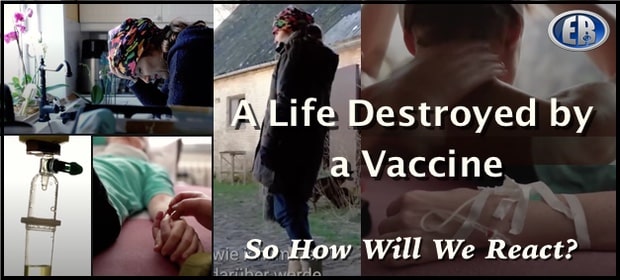
ER Editor: Below is a truly harrowing, 11-minute video by OvalMedia of a young Danish woman, Sidse Kaersgaard, whose life has become a living hell following an initial Pfizer vaccine in June of last year. Suffering from neurological damage that has radically altered her life, leaving her in pain, shivering, unable to think, focus, sleep and feel normally, with a constant buzzing in her head, she has exhausted treatment options through the Danish healthcare system. An activist herself, she doesn’t understand why we don’t all come together and organize ourselves for those whose lives have been ‘destroyed by this experiment’.
She has also appeared in an interview with Reiner Fuellmich and Viviana Fischer – see https://archive.org/details/stiftung_corona_ausschuss_sitzung_99
Michel van der Kemp invokes the Ursula Le Guin story of a fictional utopian town called Omelas, whose idyllic life depends on the intense suffering of one young girl, locked away and out of sight. Not too unlike the life of Sidse following the Pfizer vaccine. Those who see this girl and her intense suffering are changed forever, forced to leave this idyllic place that depends on such suffering for its existence.
Are we like those who are forced to leave, who do nothing to stop the suffering even if the utopia (or state of avoidance) comes crashing down?
********
Omelas, a utilitarian conundrum
MICHEL VAN DER KEMP
The late Ursula K. Le Guin, wrote in 1973 a short story called The Ones Who Walk Away from Omelas. The story describes an idyllic, almost utopian society. It’s a society without disease, where everyone is beautiful, happy and healthy. But “[h]ow is one to tell about joy?” Le Guin ponders. The author struggles to give a description of this society: “[p]erhaps it would be best if you imagined it as your own fancy bids, assuming it will rise to the occasion, for certainly I cannot suit you all.” “But one thing I know there is none of in Omelas is guilt.”
Yes, how does one describe a city of happiness and joy? Would there be newspapers writing about uncle John buying a new car? Mrs. Smith and her fancy new dress? Le Guin continues and asks her readers whether they believe in the city, the joy. “No? Then let me describe one more thing.”
We then learn the city has one big secret. There is one locked door, leading to a small windowless room. It’s nothing more than a closet. In it a filthy, starved, tortured, and scared child is kept. The door is always locked, except for some people to leave food and drink. The people of Omelas all know the child is there. The people
“feel disgust, which they had thought themselves superior to. They feel anger, outrage, impotence, despite all the explanations. They would like to do something for the child. But there is nothing they can do. If the child were brought up into the sunlight out of that vile place, if it were cleaned and fed and comforted, that would be a good thing, indeed; but if it were done, in that day and hour all the prosperity and beauty and delight of Omelas would wither and be destroyed. […] To exchange all the goodness and grace of every life in Omelas for that single, small improvement: to throw away the happiness of thousands for the chance of the happiness of one: that would be to let guilt within the walls indeed. The terms are strict and absolute; there may not even be a kind word spoken to the child.”
The story continues that the people who see the child go home in tears, or a tearless rage, in a terrible paradox.
“Their tears at the bitter injustice dry when they begin to perceive the terrible justice of reality, and to accept it. Yet it is their tears and anger, the trying of their generosity and the acceptance of their helplessness, which are perhaps the true source of the splendor of their lives.”
Sometimes a girl or boy who sees the tortured child does not return home to weep or rage. They leave Omelas. They are “the ones who walk away from Omelas.” Le Guin’s short philosophical work ends there, and is deliberately vague. It describes what a utilitarian society would look like if driven to its end-point.
Utilitarianism is the idea that as long as there’s a net increase in happiness due to policy changes, we can accept suffering. Under utilitarianism, it is ok to hurt someone, as long as more happiness results from their being hurt. In the story of Omelas, all the city’s hurt is placed on one child. If utilitarianism were true, Omelas would be a just city; however, Omelas is unjust. Therefore, utilitarianism can’t be true.
In our own societies we are asked to make sacrifices for the better good of society. “Wear a mask to protect someone else” is just one example. Are we not living in Omelas today? Have policies been mandated on us by utilitarians who only see the greater good, but do not see the child in the closet? Yet, we all know the child is there.
‘My brain doesn’t work anymore’
In fact there are many such children in our society. One of those locked-up children has a name, she is Sidse from Denmark. She took two shots of the ‘vaccines’ because she thought she would help to make society better and safe. Sidse has been left with electric sensations through her whole body, sensory and motor disorders, heart palpitations, and she has not been able to sleep for eight months. Taking sleeping pills does nothing for her. This is her story:
https://odysee.com/@OVALmediaEN:0/220407_KOLL_TheFighter_EN-(YouTube):1
Sidse is just one of our young people, who are paying the price for our utopian society. We all know the children are there. Perhaps it’s time to walk away, face our collective guilt, like the ones who walk away from Omelas.
************

••••
The Liberty Beacon Project is now expanding at a near exponential rate, and for this we are grateful and excited! But we must also be practical. For 7 years we have not asked for any donations, and have built this project with our own funds as we grew. We are now experiencing ever increasing growing pains due to the large number of websites and projects we represent. So we have just installed donation buttons on our websites and ask that you consider this when you visit them. Nothing is too small. We thank you for all your support and your considerations … (TLB)
••••
Comment Policy: As a privately owned web site, we reserve the right to remove comments that contain spam, advertising, vulgarity, threats of violence, racism, or personal/abusive attacks on other users. This also applies to trolling, the use of more than one alias, or just intentional mischief. Enforcement of this policy is at the discretion of this websites administrators. Repeat offenders may be blocked or permanently banned without prior warning.
••••
Disclaimer: TLB websites contain copyrighted material the use of which has not always been specifically authorized by the copyright owner. We are making such material available to our readers under the provisions of “fair use” in an effort to advance a better understanding of political, health, economic and social issues. The material on this site is distributed without profit to those who have expressed a prior interest in receiving it for research and educational purposes. If you wish to use copyrighted material for purposes other than “fair use” you must request permission from the copyright owner.
••••
Disclaimer: The information and opinions shared are for informational purposes only including, but not limited to, text, graphics, images and other material are not intended as medical advice or instruction. Nothing mentioned is intended to be a substitute for professional medical advice, diagnosis or treatment.




